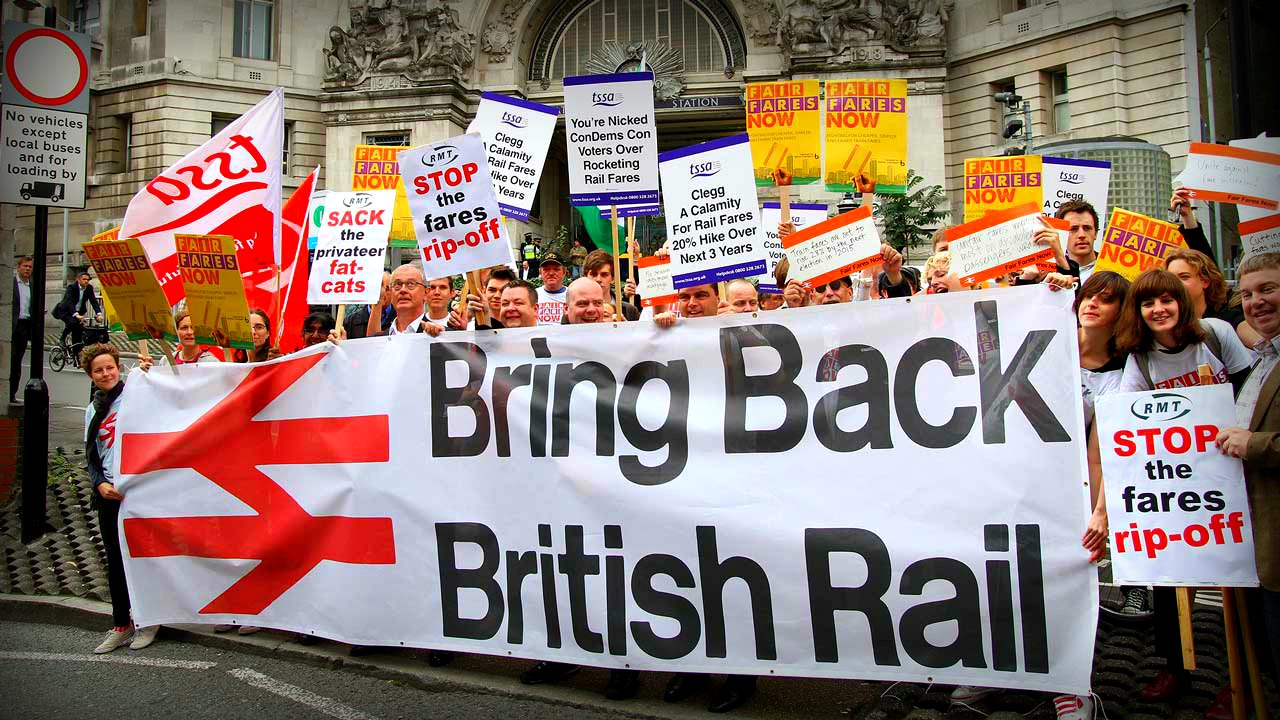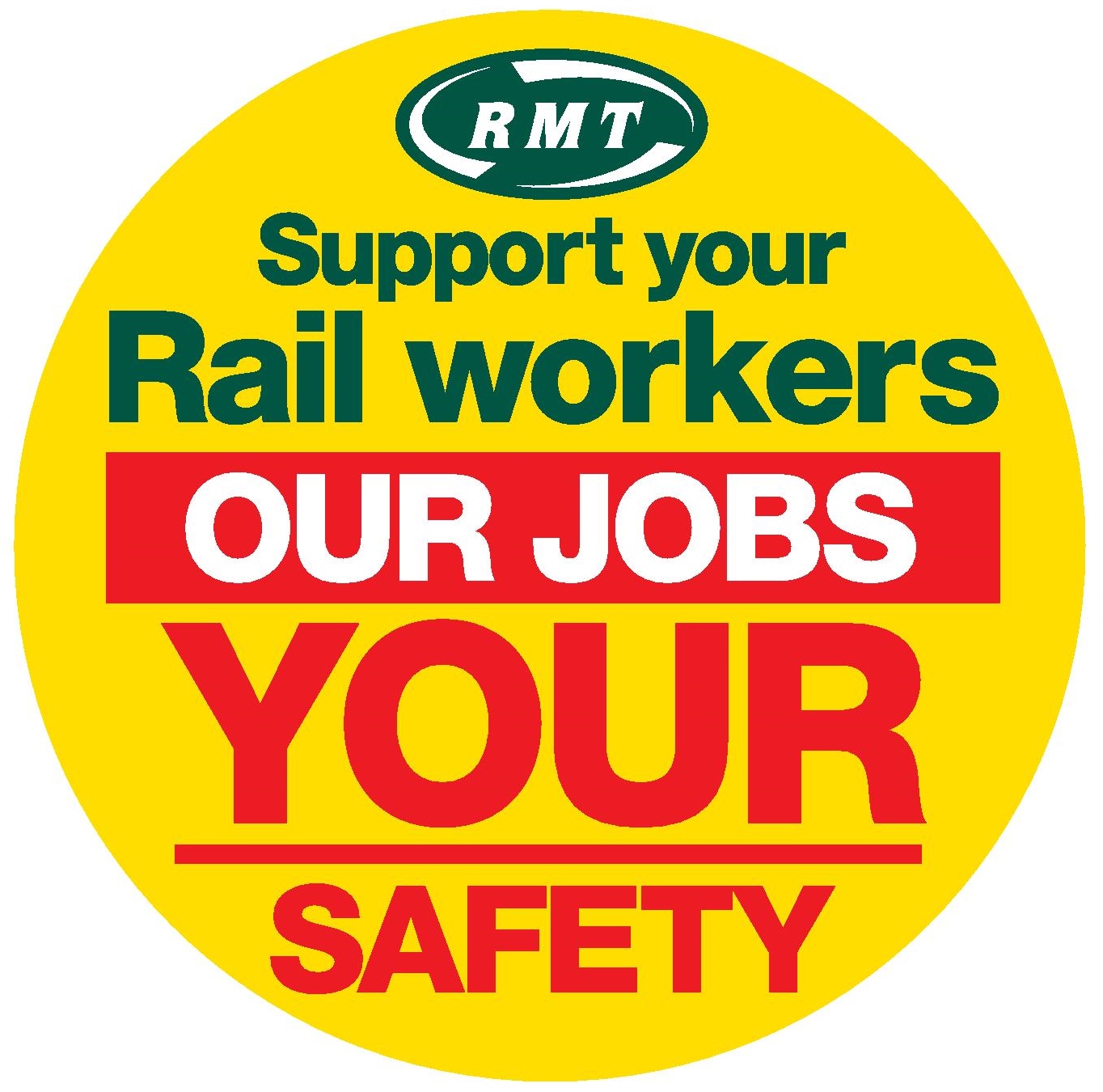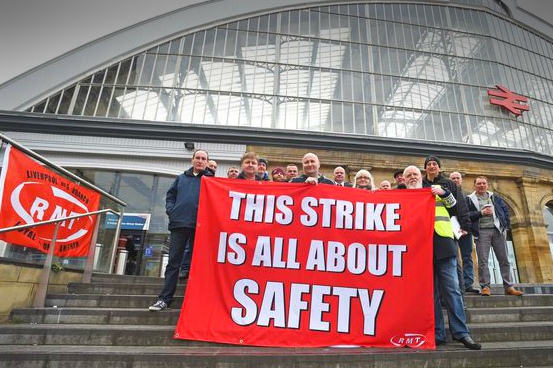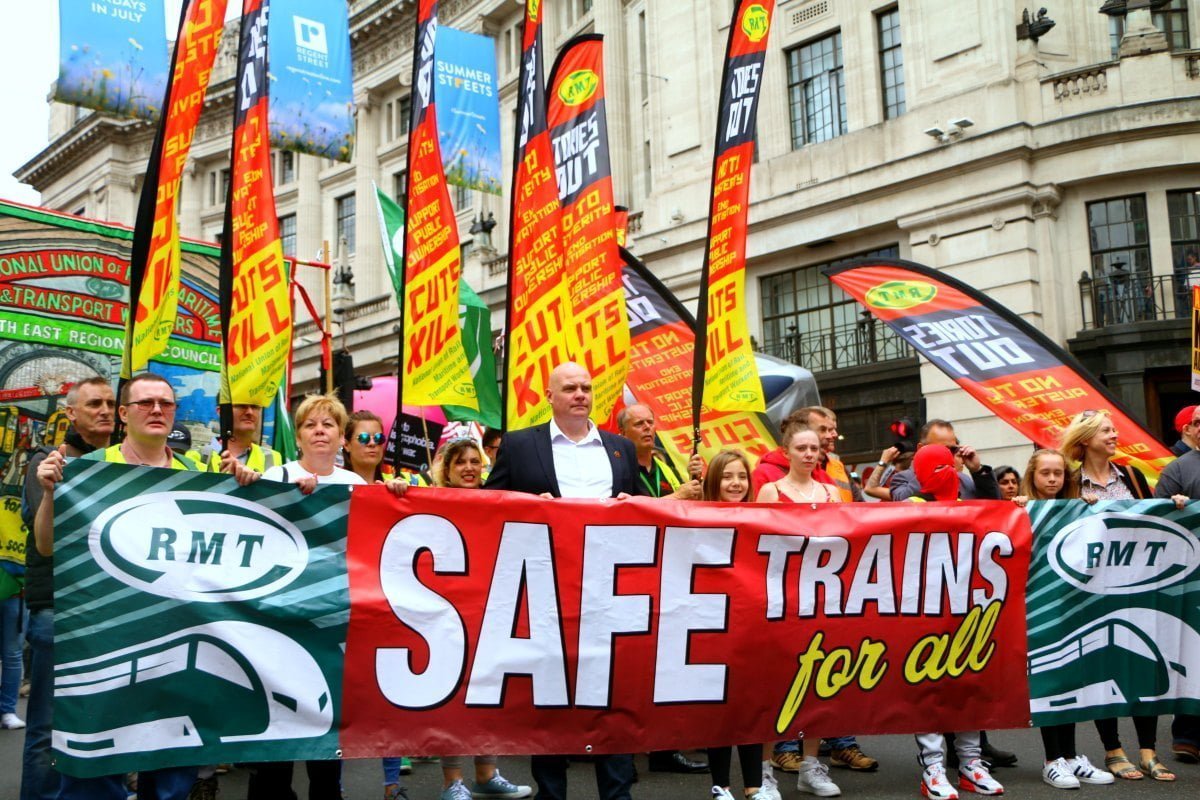A recent public meeting organised by the RMT rail union in Sheffield saw strong support for nationalisation of the railways and for the strikes taking place in defence of passenger safety.
The RMT railway union held a public meeting in Sheffield on Thursday 8th November as part of a series of events to raise awareness of the real issues surrounding their ongoing strike action. The planned removal of train guards and the implementation of “driver only operations” on many lines jeopardises not only the jobs of 1,200 guards but also the safety of all passengers.
Around 40-50 people attended the meeting in Sheffield, hearing speakers such as Louise Haigh (Labour MP) and Lewis Dagnall (Sheffield City Council, Labour), along with Bob Jeffery, a spokesman from the TUC in Sheffield, and Steve Hedley, senior assistant general secretary.
Nationalisation
 Hedley painted a picture of the dire situation of the guards and stressed their role as guarantors of safety onboard trains. The speakers and audience were in a militant mood, calling for solidarity among unions. The teachers’ union, the NEU, pledged financial support, as well offering solidarity and support on RMT picket lines.
Hedley painted a picture of the dire situation of the guards and stressed their role as guarantors of safety onboard trains. The speakers and audience were in a militant mood, calling for solidarity among unions. The teachers’ union, the NEU, pledged financial support, as well offering solidarity and support on RMT picket lines.
The discussion raised the question of ownership of the railways. According to RMT data, the public is overwhelmingly in favour of re-nationalisation of the railway system. However, nationalisation alone will not solve the problem. As Steve Hedley stressed, nationalisation will only benefit passengers and workers if it puts passengers before profit through democratic ownership.
The call for socialist policies was seconded by Louise Haigh (Labour MP) and met with applause from the audience. Lewis Dagnall in his statement, meanwhile, was eager to express the support of Sheffield City Council for the RMT strike, but he fell rather quiet when the demand for nationalisation was raised.
Solidarity
 The strengthening of solidarity between unions and the public was also raised. Train drivers in the ASLEF rail union have so far not refused to cross picket lines, due to the threat of disciplinary action at work. Nevertheless, they are prepared to offer solidarity in the upcoming strikes. In Sheffield, one ASLEF member has been refusing to cross picket lines throughout the duration of the RMT strike action. This has been warmly welcomed and encouraged by the strikers.
The strengthening of solidarity between unions and the public was also raised. Train drivers in the ASLEF rail union have so far not refused to cross picket lines, due to the threat of disciplinary action at work. Nevertheless, they are prepared to offer solidarity in the upcoming strikes. In Sheffield, one ASLEF member has been refusing to cross picket lines throughout the duration of the RMT strike action. This has been warmly welcomed and encouraged by the strikers.
Because of Christmas shopping traffic and up-and-coming football matches in Sheffield, rail union members are hoping that future action may prove more effective in the coming weeks. Furthermore, there are plans for a large rally in Sheffield outside the station on 15th December, with speakers from the RMT and local Labour MPs, in order to raise the visibility of the strike and the issues surrounding it.
The public can support those on strike by visiting picket lines, helping to distribute flyers, and encouraging other passengers not to cross the picket lines. Activists with Sheffield Socialist Appeal and the local Marxist Society have been supporting the picket lines on Saturday mornings by helping to hand out flyers at the front of the station. Students have been very keen to get involved and offer solidarity.
Workers’ control
 Contributions in the recent public meeting highlighted the importance of raising demands that go beyond these individual strikes, linking the issues involved to the struggle for socialism. The fight to keep the guards on the trains shows clearly how capitalism puts private profits before people’s safety.
Contributions in the recent public meeting highlighted the importance of raising demands that go beyond these individual strikes, linking the issues involved to the struggle for socialism. The fight to keep the guards on the trains shows clearly how capitalism puts private profits before people’s safety.
But renationalisation alone will not solve the problem. Ultimately, nationalised railways – and other nationalised industries – need to be put under democratic workers’ control, as part of a wider socialist plan in the economy.
The case of the German rail company, Deutsche Bahn (which happens to be the parent company of Northern), provides a good example of this. Since Deutsche Bahn’s formation in 1994 after German reunification, it has been a joint-stock company, with the German state as the sole shareholder. Nevertheless, fares for passengers have skyrocketed.
In the course of a partial privatisation plan, Deutsche Bahn laid-off 150,000 workers on the German railway system, while at the same time planning new flashy train stations with taxpayers’ money.
In 1994, the mega-project Stuttgart21, the reconstruction of the main station and new high-speed tracks from Paris to Munich, were announced with an estimated cost of 4 billion DM (2 billion euro). Since the beginning of construction of this highly controversial project in 2010, costs have spiralled and are now expected to rise to 10 billion euros. And obviously it is taxpayers who are expected to foot the bill.
During the 2010 protests against this mega-project, hundreds were injured by water cannons and pepper sprays, leaving one person permanently blind.
After eight years of delayed trains due to construction work, the estimated finishing date has been delayed yet again to 2025. And where has all the money gone? Into the pockets of the managers and consultants.
This shows that nationalisation – whilst a necessary first step – by itself does not solve the problems that rail workers and passengers face. This is why we need democratic workers’ control and management, so that the organised working class is really in control of this vital economic infrastructure, and not the bosses or bureaucrats.
On the back of attending this meeting, Sheffield Marxist society attended picket lines on 10th and 24th November. We are now mobilising the Marxist society to support future pickets, as well as at the rally on 15th December. Students and workers: unite and fight!






